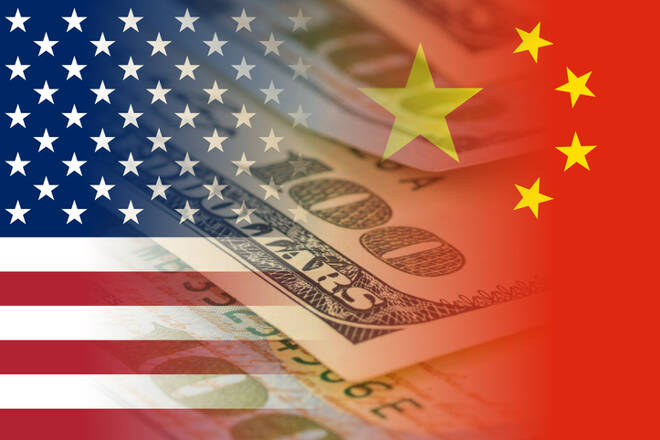Advertisement
Advertisement
Tech Stocks Face Exposure if China Decides to Retaliate Against US Treatment of Huawei
By:
China could have a direct effect on corporate earnings and therefore future stock prices if it chooses to make life more difficult for U.S. companies doing business in China. Analysts say China has encouraged consumer boycotts in the past, and used inspections and regulatory harassment against foreign firms and could do so again.
In the latest twist affecting U.S.-China trade relations, President Donald Trump on Wednesday declared a national emergency over threats against American technology, the White House said.
The decision is putting some pressure on the Asia stock markets on Thursday with mainland Chinese shares lower in the early trade. The news helped offset Wednesday’s decent performance on Wall Street that was fueled by reports that Trump plans to postpone auto tariffs by up to six months.
The recent price action in Asia and the U.S. highlights how sensitive investors have become to trade news.
Following Trump’s executive order, the U.S. Department of Commerce announced the addition of Huawei Technologies and its affiliates to the Bureau of Industry and Security (BIS) Entity List, making it more difficult for the Chinese telecom giant to conduct business with U.S. companies.
The Details
Trump’s executive order, authorized the Commerce Secretary Wilbur Ross, in consultation with other top officials, to block transactions that involve information or communications technology that “poses an unacceptable risk to the national security of the United States.”
Commerce Secretary Wilbur Ross said in a statement that President Trump backed the decision, which will “prevent American technology from being used by foreign owned entities in ways that potentially undermine U.S. national security or foreign policy interests.”
The order means that U.S. companies cannot sell or transfer technology to Huawei without a license issued by the BIS. That could make it harder for Huawei to do business, as it depends on some U.S. suppliers for parts.
Huawei’s Response
Huawei responded by saying its work does not pose any threats and that it is independent from the Chinese government.
“Restricting Huawei from doing business in the US will not make the US more secure or stronger,” the company said in a statement.
“Instead, this will only serve to limit the US to inferior yet more expensive alternatives, leaving the US lagging behind in 5G deployment, and eventually harming the interests of US companies and consumers.”
The company also said “unreasonable restrictions” on Huawei raised “other serious legal issues”.
Will China Retaliate Over U.S. Sanctions?
Foreign Ministry spokesman Lu Kang said Beijing opposed countries imposing unilateral sanctions on Chinese companies and would take action.
Beijing also accused President Trump of engaging in industrial sabotage by using state security as “as a pretext for suppressing foreign business”.
“We urge the US to stop this practice and instead create better conditions for business co-operation,” Mr. Lu said. He did not give any details over how China planned to retaliate.
How Can China Retaliate Against the United States?
China could have a direct effect on corporate earnings and therefore future stock prices if it chooses to make life more difficult for U.S. companies doing business in China. Analysts say China has encouraged consumer boycotts in the past, and used inspections and regulatory harassment against foreign firms and could do so again.
China could limit purchases of U.S. Treasurys or sell them or weaken the Yuan. According to reports, China recently reduced its holdings to the lowest level in two years.
According to Adam Segal, director of digital and cybersecurity at the Council on Foreign Relations, “… Apple would be the most likely target because its products are sold directly to consumers, but China may not want to rev up consumers too much. There is a worry that if you mobilize too much nationalist sentiment, that you can’t control it,” he said.
Dan Ives, managing director and technology analyst at Wedbush also said Apple is the company at most risk for retaliation, but China may not want to be too hard on Apple since it employs 1.4 million people their including Foxconn. “But realistically, I think that could only impact 3 to 5% iPhone purchases in the country. That’s what I would call a pretty contained issue for Apple.”
Other companies at risk include Qualcomm, Skyworks and Micron.
About the Author
James Hyerczykauthor
James Hyerczyk is a U.S. based seasoned technical analyst and educator with over 40 years of experience in market analysis and trading, specializing in chart patterns and price movement. He is the author of two books on technical analysis and has a background in both futures and stock markets.
Advertisement
